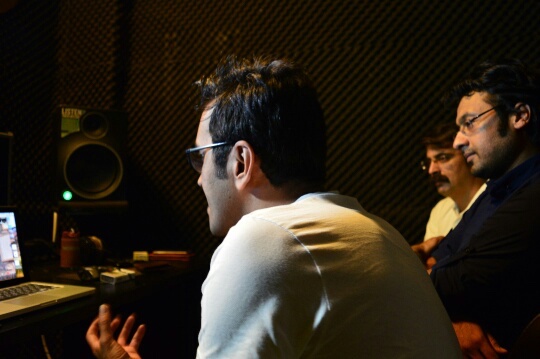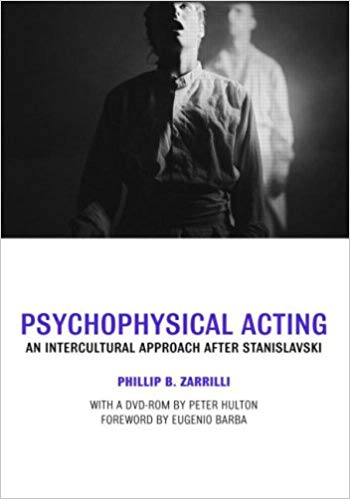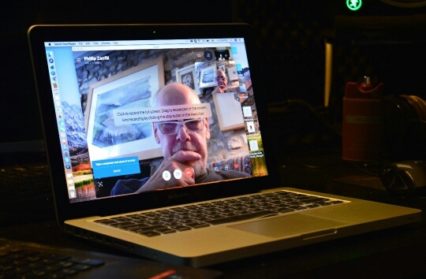Acclaimed writer and director Phillip Zarrilli recounts the transcontinental communications he had with fellow writer and director Alireza Mahvelati in Iran, and how initial conversations around the translation of his latest book into Farsi developed into far reaching lessons about craft and practice.
Phillip Zarrilli: (initial communication)
Approximately ten days ago, Alireza Mahvelati contacted me via email from his home base in Mashhad, Iran. He was inquiring about the possibility of translating my 2009 book, Psychophysical Acting: an intercultural approach after Stanislavski (London: Routledge Press), into Farsi. [In 2014 my book was translated into Mandarin and released as part of the 2014 Taipei Festival for which I had been invited to direct the world premiere of Kaite O’Reilly’s the 9 fridas with Mobius Strip Theatre (Taipei).]
I immediately referred Alireza to the Theatre/Performance Studies list editor at Routledge Press only to be told via return email that unfortunately, at this point in time it was impossible for the press to conduct any business with Iran. Welcome to the ‘realities’ of Donald Trump’s withdrawal from the nuclear power agreement, and his imposition of sanctions against Iran which include and extend to the UK of course. It had not occurred to me that translation of books would be under the same sanctions! Silly me…
As an artist, writer, and teacher, what interests me most is exchange and sharing of processes and ideas. So it was, however naively, a bit of a shock to feel the impact of Trump’s actions on something as seemingly innocuous as potential translation of a book about acting into Farsi.
 But just as important if not more important was what followed. Alireza asked if we might have a skype interview/discussion based on his reading of my book—and that of his theatre colleagues. Alireza has been working together with Mahla Bazregari, Ehsan Rouhi, and Danoush Yazdan Panah as an independent theatre group (‘Dramaturg Theatre Group’), and they have been inspired in their considerations of acting by the alternative view of acting and performance offered in Psychophysical Acting.
But just as important if not more important was what followed. Alireza asked if we might have a skype interview/discussion based on his reading of my book—and that of his theatre colleagues. Alireza has been working together with Mahla Bazregari, Ehsan Rouhi, and Danoush Yazdan Panah as an independent theatre group (‘Dramaturg Theatre Group’), and they have been inspired in their considerations of acting by the alternative view of acting and performance offered in Psychophysical Acting.
So a few days ago I was privileged to have an initial 50 minute conversation with Alireza and his colleagues, responding to a series of questions they had prepared about acting. What a refreshing exchange it was. Their curiosity and passion was exhilarating. It was clear that they shared a desire to learn, understand, and grow as young theatre artists/actors in search of alternative ways of working and understanding acting and performance processes. I talked about my understanding of acting, how I approach training of actors through a preparatory process of performer training, and how important it was to get beyond the limitations of the notion of ‘character’ on acting, especially when working on Beckett’s plays, or when co-creating/devising new performance—as with The Llanarth Group’s creation of Told by the Wind or playing ‘the maids’.
Amongst those in the group in Mashhad, Mahla Bazregari is a playwright. In our conversation her ears obviously perked up when I mentioned my close collaboration with Kaite O’Reilly and the complex dramaturgies of her plays. They immediately wanted to get hold of copies of Kaite’s plays in order to devour and understand her writing and the complex dramaturgies that inform her writing. So a list has been sent through. And I expect they will devour her plays when they arrive.
A conversation has been opened with Alireza and his colleagues in Mashhad, and so I turn over this specific conversation to Alirez, et al, to offer their thoughts about our exchange.
Alireza Mahvelati: (responding)
What a fascinating experience. Mahla Bazregari (my colleague friend in our theatre group) and I started reading a marvelous book on acting written by Phillip Zarrilli: Psychophysical Acting: an intercultural approach after Stanislavski (London: Routledge Press, 2009) while we were thinking about how to make a better understanding of what an actor should engage in when doing preparation for a role in a play. The problem we were dealing with arose as we were thinking about the relation between the actor’s living experience and the role which she/he is about to play on the stage. Thinking about the relation between body and mind and the philosophy of acting, we came across Phillip Zarrilli’s book with which amazed us. Psychophysical acting”:what a great name for a book, especially when seeing the rest of the title: “an intercultural approach after Stanislavski”. That was what we were really looking for.
There was another problem though. Buying that book from Amazon was impossible, so I had to ask one of my friends living in Australia to get the book and bring it with her to Iran. After 3 months, we received the book and voraciously started reading it. I have to confess that this book is miraculous. We had heard about “psychophysical” before, yet this reading, this approach, this insight into body and mind in order to achieve acting was quite astounding. What amazed us mostly about Zarrilli’s ideas was the fact that he has been trying to eradicate the duality of mind and body which has dominated the western philosophy for a long time. Once Gilles Deleuze, the French philosopher, pointed out that the role of philosophy is not to remind people of what they already know, but pushing them into creating new concepts. This is only the theory; however, Zarrilli seems to have transformed the whole concept mentioned in Deleuze’s philosophy and the notion of body and mind in Husserl’s phenomenology into practice which makes understanding of creativity quite possible for everyone.
 While reading his book, Mahla suggested that I start translating the book, and I was really passionate about doing so. There is no copy-right rule in Iran and unfortunately everyone starts translating a book into Farsi without the author’s permission. I have never done that and in our theatre group in Iran, this has been prohibited. Therefore, I decided to email Zarrilli to ask his permission. Very immediately I received Phillip’s reply showing his deep interest in his book being translated into Farsi, and also mentioning that his book had been already translated into Mandarin. Mahla and I were absolutely thrilled and Phillip said that he would put me through to the person in charge in Routledge Press so that I could ask their permission. Unfortunately, our happiness did not last too long when the person in charge declined our request due to sanctions imposed on Iran by Donald Trump’s government which came as a shock. Nevertheless, Philip insisted on his request and thanks to his support, the permission right for the book to be translated into Farsi was transferred to him, and he issued a formal permit for me to get the book translated into Farsi. I greatly appreciate his deep kindness and support which comes from his profound enthusiasm about sharing ideas. I have been looking for a reputable publishing company and I have done some negotiations with Afraz Publishing company which is one of the oldest and most experienced companies working in the field of theatre and drama and most probably we will reach an agreement on publishing Zarrilli’s book soon enough and the process of translation will get started as soon as possible.
While reading his book, Mahla suggested that I start translating the book, and I was really passionate about doing so. There is no copy-right rule in Iran and unfortunately everyone starts translating a book into Farsi without the author’s permission. I have never done that and in our theatre group in Iran, this has been prohibited. Therefore, I decided to email Zarrilli to ask his permission. Very immediately I received Phillip’s reply showing his deep interest in his book being translated into Farsi, and also mentioning that his book had been already translated into Mandarin. Mahla and I were absolutely thrilled and Phillip said that he would put me through to the person in charge in Routledge Press so that I could ask their permission. Unfortunately, our happiness did not last too long when the person in charge declined our request due to sanctions imposed on Iran by Donald Trump’s government which came as a shock. Nevertheless, Philip insisted on his request and thanks to his support, the permission right for the book to be translated into Farsi was transferred to him, and he issued a formal permit for me to get the book translated into Farsi. I greatly appreciate his deep kindness and support which comes from his profound enthusiasm about sharing ideas. I have been looking for a reputable publishing company and I have done some negotiations with Afraz Publishing company which is one of the oldest and most experienced companies working in the field of theatre and drama and most probably we will reach an agreement on publishing Zarrilli’s book soon enough and the process of translation will get started as soon as possible.
While doing our correspondence, I made a request from Phillip to have an interview with us based on his ideas mentioned in his book, and again fortunately he agreed to do so. I talked to Mahla about this and two of my best friends and colleagues–Ehsan Rouhi and Danoush Yazdan Panah–who are both experienced theatre directors and researchers. We decided to prepare our questions based on our concerns about acting approaches after Stanislavski, and I set a time with Phillip for the interview. On the 28thof June, at 12:30 p.m. UK time we started our conversation with Phillip which took about 50 minutes. That was fascinating. Really exhilarating. I asked the questions and Phillip, very very patiently answered all of them. It had been a dream come true for me having a chance to meet one of the role models of my life. He explained all the ins and outs related to his ideas very clearly. He told us about his precious experiences working with different actors, which were really useful for us as young directors and actors. I ended the questions with asking about Phillip’s latest book, (toward) a phenomenology of acting, which will be published by Routledge this October. Having finished Psychophysical acting, I will definitely ask Philip for permission to translate his latest book into Farsi, and I hope I can manage that. The interview is in the process of being translated into Farsi and soon enough we will publish both the film and the written form to make this possible for all interested and passionate theatre activists to get familiar with Phillip Zarrilli’s ideas of acting and philosophy of theatre.
What was also interesting was that while talking to Phillip, we realized that he has been working with his close collaborator and well known playwright, Kaite O’Reilly. Mahla Bazregari is also a playwright, so she was fascinated and we asked Phillip to send us a list of Kaite O’Reilly’s published plays so that we can buy them. The day after, again very kindly, Phillip sent us the list and we managed to buy them from Amazon and since we have a Kindle account, we could buy the electronic versions of Kaite O’Reilly’s books, of course the ones which were available for Kindle.
Mahla and I have already read two of the plays which astonished us. We have been so fortunate getting familiar with Phillip Zarrilli and Kaite O’Reilly. Mahla is writing some notes while reading Kaite O’Reilly’s plays, and she is doing her own analysis on them which will be sent to Phillip and Kaite soon enough. Actually, she is devouring them. She told me that she is going to ask Kaite’s permission to translate her plays into Farsi, and if possible, perform one of them. I strongly and hopefully believe that this is going to be a turning point in our theatrical life.
We have set up a theatre group named “Dramaturg Theatre Group” intending to work professionally on theatrical works and producing quality performances along with doing research and critical writing about both Iranian and international theatres since we realize that criticism of theatre is a real necessity nowadays, especially in Iran. I believe that getting familiar with Phillip Zarrilli, Kaite O’Reilly and The Llanarth Group could be of great help for us in this way, which we greatly appreciate it.
We hope that this exchange of ideas and cooperation both in research and performance could be continued in the future.
Phillip Zarrilli: (brief follow up response)
The initial dialogue and exchange recorded above is obviously continuing as I write this brief response to Alireza’s return message. Throughout my career as a director, actor-trainer, writer, and performer I have always valued above all else interacting with those who have a shared interest. I have been fortunate when early in my career to have had mentors who challenged me to learn—my direct teachers or those who have guided me such as Gurukkal Govindankutty Nair, M.P. Sankaran Namboodiri, Killimangalam Vasudevan Namboodiripad, A.C. Scott, and those who oversaw my initial reading of philosophy many years ago at Ohio University, especially Troy Organ. And I have had wonderful encounters and discussions with Eugenio Barba, Richard Schechner, Esa Kirkopelto, Rustom Bharucha, Navtej Johar, Christel Weiler, Erika Fischer-Lichte, and many others that have enriched my thinking. It is an honour and privilege to open this dialogue with Alireza, Mahla, and their collaborators.
Although this initial dialogue has been primarily between Alireza and I, I have no doubt that this dialogue has already expanded to include communication between Mahla and Kaite as playwrights/dramaturgs. Whatever the ‘supposed’ boundaries that Donald Trump and others may impose, what is important is that we find a way into continuing these types of intercultural dialogues.
To conclude this brief further response I would just mention that another key source of inspiration and understanding for my own practical work and thinking has come from my encounter with Sufism—first through my practical training with C. Mohammed Sherif at the Kerala Kalarippayattu Academy in Kannur, and subsequently through my readings in Sufism, most recently in relation to considering the centrality of ‘imagining’ in the embodied consciousness of actors/artists. This will no doubt be a subject which we may discuss further.
Alireza Mahvelati (concluding note)
This is going to be my brief reply to Phillip Zarrilli’s kind response to my return message. A golden opportunity has been created in starting a dialogue with Phillip who has definitely and seriously opened a real philosophical interpretation and conceptualization of acting. What astonished me and Mahla in this practically valuable and exhilarating experience is the fact that Phillip is helping those interested in exchanging ideas so generously that no political obstacle could stop the exchange. The initiation of this sharing of ideas and discourse means that art and also the beauty that is created by it can go beyond boundaries. Phillip is talking about the ones who have provided him with teachings and trainings open-handedly, and I would like to name Phillip Zarrilli as our real teacher and trainer who is not only influencing us as much as theatre, performance and acting are concerned, but also instructing us in what really makes us humans. From the very beginning of this Dialogue, Mahla and I were telling each other that Phillip’s first lesson to us was humanity and respect from which the real art of theatre starts. Art is nothing but a concept which is about to transform this world into a more beautiful place for all humans to live with each other peacefully. This very important lesson we learned from Phillip Zarrilli at the start of our dialogue.
Again I would like to refer to a very important concept coined by Gilles Deleuze named “Difference” and also a term created by his colleague Felix Guattari, the French Philosopher and Psychoanalyst named “the lines of flight”. Both these concepts in essence are trying to insist on the fact that life equals to the beauty of existent differences in the world and also the way these differences could help people fly beyond their territories to talk to each other and create novel ideas and notions. Phillip Zarrilli is exactly doing so with the use of theatre and philosophy of art. Although, as Phillip mentioned, the initial dialogue started between Phillip and I, the plays that Kaite O’Reilly has written are proving so about which Mahla has been talking since she has started reading them. Hopefully she would write about them soon enough.
Thanks to Phillip’s generosity in sharing his philosophically and theatrically novel ideas, a perfect communication and dialogue has started, and we are so hopeful about its being as highly fruitful as possible in the near future.
We owe Phillip as our greatest teacher since this is the first time we are learning the true meaning of Art as well as its genuine functions which might have been forgotten due to political interferences which have created these insensible problems and distances in the world of real Art.
To conclude, Sufism mentioned by Philip has been the inspiration for many great Iranian poets including Rumi, Hafez and many other ones in the history of literature. Many plays have also been being inspired by Sufism in Iran. It really does have a significant role in Iranian art and history. My curiosity has been aroused regarding how it could evoke acting and performance. To me also, this would be a great subject about which further discussions could be formed undoubtedly.
Phillip Zarrilli was a visionary theatre-maker, academic and teacher.












